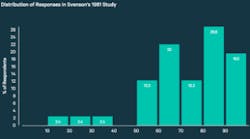Illusory superiority: Why it's important to measure your dental practice performance
"Illusory superiority" means that humans are naturally inclined to overestimate their performances and capabilities relative to others. Has your dental practice overestimated its performance in various areas, for instance, hygiene?
It's often said that hygiene is the backbone of a successful dental practice. Not only are hygiene appointments responsible for a substantial percentage of a practice's production, but they also help keep your patients engaged with your practice and enable you to diagnose any issues that need to be treated.
But do you know how your hygiene reappointment rates compare to other practice’s rates? Chances are, you're probably not doing as well as you think. This is due to a concept in psychology known as "illusory superiority," which states that humans are naturally inclined to overestimate their performance and capabilities relative to others.
An often-cited example of illusory superiority is a study conducted in 1981 by Ola Svenson, who surveyed 81 students from the University of Oregon regarding their driving skills. When asked to rank their driving skills in comparison to other participants (without having any knowledge of one another’s driving skills), the survey resulted in the following distribution:
As you can see above, 19.5% of participants estimated that they were in the top 10th percentile of respondents, 46.3% estimated that they were in the top 20th percentile, and so on. In all, 93% of participants estimated that their driving skills were in the top half of participants.
This study implies that people have a tendency to overestimate their abilities when comparing themselves to others. With this in mind, let's revisit the earlier question—How do you think your hygiene reappointment rate compares to other dental practices? Are you actually a top performer, or could you be suffering from illusory superiority? The truth is, if you aren't measuring your performance you have no way of knowing.
According to Weston Lunsford, CEO of Dental Intelligence, a company that provides web-based dental business intelligence software, "We work with many practices that think their hygiene reappointment rate is close to 100%. But when they plug into our system for the first time and actually begin measuring their performance, they're often surprised at how low it is. We've seen practices with hygiene reappointment rates as low as 42%. Without the numbers, we only have our assumptions and feelings to work with. Often, when it comes to how well we are performing, our assumptions are usually better than reality."
Though hygiene reappointment rate is one of the most important metrics for dental practices to track, it's just one example of a KPI—the same can be said for other metrics, such as production per visit, case acceptance rate, and new patients per month.
How can you measure your practice's performance?
Most dental practice management systems come equipped with a variety of built-in reports that can help the owner analyze many high-level KPIs. This is an excellent starting point if you want to analyze your data.
If your system doesn't expose all of the KPIs you want to monitor, or if it makes it difficult to create the reports you think would be most useful, you might want to consider investing in business intelligence software, such as Dental Intelligence. These systems typically integrate with your practice management software, extract the relevant information for you, and assemble the data into easily digestible reports and dashboards that you can analyze regularly. Some systems also email you daily summaries of your practice's performance.
While these systems typically charge a few hundred dollars per month, it's worth noting that they deliver valuable insights that can help identify your practice’s inefficiencies. They remove the burden of compiling your own reports, and automatically help bring the most relevant metrics to light so that you can easily analyze and interpret your data.
Business intelligence software is one of the most overlooked types of software in dental practices, but it can be a vital tool that helps you take a data-driven approach to improving your practice. This software is a wise investment for any practice interested in identifying areas for improvement.
Make data-driven decisions
A common mistake of practices new to analyzing is to look at too much at once. This can cause more harm than good and may lead to paralysis by analysis. Focus only on the metrics your practice cares about and not on too many metrics at once. Select a few key metrics that you want to prioritize and monitor them on a regular basis.
If you identify that some metrics are underperforming, either in relation to your personal goals or compared to generally accepted healthy ranges for these metrics, then work with your staff to create a strategy to improve their performance. Including your staff in these discussions gives everyone a sense of ownership and motivates the team toward a common goal.
Once you implement a strategy it's important to monitor your metrics over time so you can be sure you're achieving the desired results. If you don't observe any noticeable improvement then you may want to revisit your strategy.
If you make it a priority to collect, measure, and analyze your data, you’ll be able to form a clear picture of where your practice stands and what changes you need to make to help your practice thrive and provide better care. This way you can be sure that you're actually a top performer instead of simply assuming that you're a top performer.


